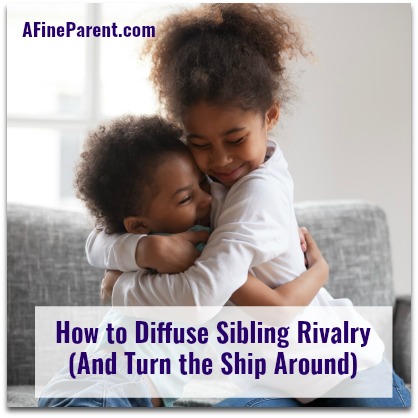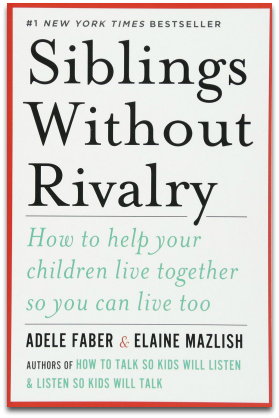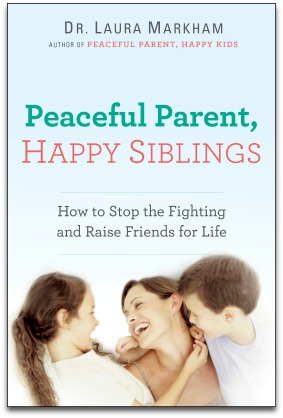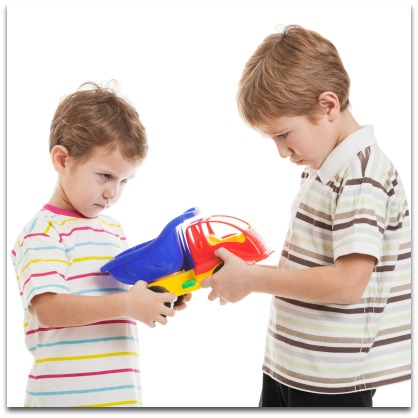 When Jill brought her second baby home from the hospital, her 4-year-old daughter, June, jumped up and down with delight to the point of exhaustion.
When Jill brought her second baby home from the hospital, her 4-year-old daughter, June, jumped up and down with delight to the point of exhaustion.
There was a big party to welcome her baby brother, and she had a total blast. As the last guest was leaving, June ran after her and screamed, “Wait, lady, you forgot your baby!!”
June’s delight turned to dismay. She cried for days, was fussy all the time, and behaved as if the worst thing in the world had ever happened to her. The sibling rivalry that ensued between June and Luke got worse as they got older, especially as he started crawling and becoming a real person.
Everything became a competition. They always fought over toys, and although they hugged and said they loved each other, Jill was deeply worried about their long-term bond. She just wanted them to grow up and be friends – maybe not best friends, but certainly close enough to rely on each other. Meanwhile, she wanted a home without the constant yelling, crying, and bickering.
Does any of this sound familiar?
OK, let’s begin by talking honestly about conflict. Sibling rivalry is all about conflict. In fact, our sibling is one of the first people we will routinely have conflict with.
The truth is, when any two or more people spend lots of time together, conflict is inevitable.
Conflict is a form of energy and life. It’s evidence that more than one thought, feeling, and approach exists. Without conflict, we would stagnate and wither.
Conflict lets us know we’re alive and that we have a point of view in the world.
Conflict, in and of itself, is not a problem.
As parents, our goal as we raise self-assured independent thinkers cannot be to avoid conflict. The goal is to work through our conflicts with our relationships and sanity intact.
Strange as it sounds, a conflict-free home is NOT a peaceful home.
A conflict-free home would be an emotionally shut-down space with underlying tension. If you’ve ever been in a home that doesn’t allow conflict, you know it’s like walking on eggshells.
Peaceful homes are vibrant and full of energy, with room for emotions and disagreement. Peaceful homes are safe spaces to disagree.
That said, the way we handle conflict can present real challenges. How we learned to handle conflict when we were children created our hard-wiring for how we handle conflict now.
And how we handle conflict is the way our children learn to handle conflict.
I did a personal deep-dive into the research on sibling rivalry heavily featuring the books Siblings Without Rivalry by Adele Faber and Elaine Mazlish, and Peaceful Parent, Happy Siblings by Dr. Laura Markham.
 |
 |
This has led me to 3 big ideas:
#1 Sibling Relationships Set the Stage for Future Emotionally-Intimate Relationships
One of the biggest advantages to having a sibling is the opportunity to get lots of practice negotiating conflict, resolution, repair, and forgiveness.
These are essential skills they need their whole lives to build healthy, connected relationships – including their eventual choice of partner.
#2 We Must Help Siblings Manage Their Relationships and Conflicts
If you want your child to one day bring home someone who you truly like as a mate for your child, someone they will be able to forge a lifetime relationship with, then you’ll want to support the sibling relationships now as much as you can.
This means staying in earshot when the kids are playing, so you can hear when the tension starts to rise. If you stay tuned-in to the escalation of their conflicts, you can start to alert them to when they need to take a break, change their tone, or “disengage” from each other.
#3 Siblings Need to Feel Unique and Equally Loved by Us
Having a sibling can be a disorienting and threatening experience for many children. It can make them anxious or worried about a lot, including if there’s enough love to go around.
From day one of having a multi-child home, a great practice is to tell each child what you love about them that’s unique to them. That way, they feel known and loved for who they are.
Managing Conflict at Home
 Step 1: Simply accept it when it arrives
Step 1: Simply accept it when it arrives
It’s actually quite liberating to know that conflict is an inevitable part of the human condition. Avoiding conflict will eventually make matters worse for everyone, because conflict avoidance is the seed of passive-aggressive behavior.
Step 2: Get curious
When a conflict is erupting or already in full bloom, ask yourself:
- What is the conflict about on the surface?
- What is beneath the surface?
- What triggered the conflict?
- What does everyone involved truly want?
This requires you to get involved, which flies in the face of conventional parenting advice that says you’re supposed to “let the kids work it out themselves.”
What happens when young children are left to work it out?
There’s a fairly predictable pattern:
- They use the limited tools they have in their toolkit, which usually boils down to either physical force or verbal manipulation.
- Then we get mad at their solution, and we step in to punish them as a way of controlling their behavior.
- Everyone ends up crying, frustrated, and we likely send everyone to separate corners.
You can see how this old-school system doesn’t work.
In the new-school system, we mindfully guide our children through conflict. Phrases such as, “Whoa, I hear a lot of yelling,” or “Everybody freeze a second,” can help stop conflict from escalating further.
Once things calm down, we can ask curious questions without judgment.
“Can you tell me (one at a time) what was going on?”
Once you have heard everyone you can continue with, “OK, let’s back up to where we think it really began,” can help get to the root of the conflict with everyone feeling heard.
This allows each child to tell you their side of the story and feel like you are really hearing how right they are.
The bottom line is we must get involved so we can teach and guide our kids. Yes, it takes longer in the short-term – but in the end, it takes a lot less time and involvement on our part.
The long-term outcome of helping your kids resolve their conflicts now is that you’ll get children who can resolve conflicts their whole lives.
Shifting your mindset and learning a new way to help siblings negotiate conflict will do a lot to change the trajectory at home and help you raise loving siblings for life.
2-Minute Action Plan for Fine Parents
Drop the Fairytale Fantasy
Tell yourself that it’s normal for siblings to fight. Remember, conflict is an opportunity for them to grow and learn how to negotiate tension with someone they love.
Listen Up
Give each child a chance to tell their side of the story, while the other child listens. If this doesn’t work or your kids are too young to sit through this exercise, then separate them to be sure each child feels totally heard by you before you take action.
Ongoing Action Plan for Fine Parents
Replace “Fair” with “Kind”
To kids, fair means “even-steven.” Instead, use “kind.” Asking kids to think with kindness leads to much more creative solutions than figuring what’s merely fair on the surface.
Tune-In to The Fights
Listen to your kids’ arguments. See if any patterns emerge, and if you can show your kids they are stuck in a pattern.
Re-think Your Overall Strategy
Rather than trying to raise your kids as siblings, try a new strategy of raising them as if they were friends. This can help re-frame how they interact, play, and argue.
Sar, I honor your question and desire to parent more peacefully. I would like to hear more about what’s going on, rather than hand you a bunch of Band-Aid- level solutions. Unless we figure out what’s going on beneath the problem, the problem will persist. The best way for me to really help you is for us to talk. I offer parents a one-time free consultation, in which I can really dive in with you and provide a roadmap for you to move forward.
Please email me to set one up: hello@lainelipsky.com
Wishing you awesome parenting,
Laine Lipsky
Hi Sar,
Thanks for the question. When any parent gets to the point of yelling, it means they have already lost – lost control, lost patience, and lost confidence. There are always better strategies than yelling – as you clearly understand, given your note.
When your kids are zoned-in on each other, it means they’re locked into fight-flight-freeze mode and you’ll have to do something to break that mode and get their attention. Something that’s not yelling, which means you’ll have to handle your own inner-upset first.
Parenting skills are simple but not easy. It takes time, practice, and feedback. If you’d like to learn more about how to get massive success with your kids, please join my free Facebook group where I host live coaching sessions weekly.
You can request to join us here: https://www.facebook.com/groups/lainelipskyevents/
Wishing You Awesome Parenting,
Laine Lipsky
Thanks I will check out the group!
Hi Sar. Sorry to hear you are having such a challenge with your children. You haven’t mentioned their ages, and part of the drivers of this may be linked to their age and development stage.
If we put aside the ages, consider, what has them so focused they can tune me out? (btw great evidence when they say XXX is bothering me and I can’t concentrate, you have this to offer back). Otherwise, the one thing they have mastered is that when they tune you out, guaranteed they can get you yelling. Chances are they don’t do this intentionally and depending on their age, it might be a behaviour that has become a habit.
If they are youngish children, under 6, then intervening might be necessary if they do go till they hurt each other. Then afterwards have the discussion. Attempting to reason with kids during a full fight is pointless because they are more likely to be in full fight mode, and that means the listening ears are off.
If the children are older, it becomes slightly easier in the management phase, though tougher observing the physical fight. In this age group the sevens and up it is still better to set standards of behaviour that they can aspire to and some guidelines on levels of rough housing that are acceptable at home. If you have boys rough housing between them is pretty standard so finding ways to make it more ecological (good for them, good for you and good for the greater good) and if they really are mad at each other and not just play fighting it might be worth establishing some conditions about physical confrontation. The purpose being to move away from physical solutions for arguments and support them to learn to functionally fight, meaning to focus on the issue rather than attacking each other. This skillset can begin to be developed earlier through creating standards for when disagreements occur.
Also consider, rather than yelling, that you create a signal for enough. If they really do get so focused on attacking each other, a whistle can work (mother of 4 including 2 boys here).
By establishing what the family wants to have as their long term vision of how the family works. The children can then be involved in determining what that looks like and the standards and values that will enable them to create that vision in a sustainable way.
The wonderful thing of getting clarity around what the longer term vision is, takes the issues out of the day to day tactical on occurrence management, and designs a plan that they can all buy into. One of the biggest benefits we found is it takes the us v them arguments away and the agreement became the authority. It’s much harder to reject their own agreed behaviour standards.
It’s about setting them up for success as well. Acknowledging, appreciating and accepting that from time to time kids will disagree and might occasionally get out of hand. It’s the reconciliation process that is even more important.
You might find The Whole Brain Child by Daniel Siegel and Tina Payne Bryson is a great way to understand what has been happening in their development, and if they are under age 10, what is still coming.
Thank you so much for your response. My boys are 3,5, and 7. They mostly go right to physical in anger and yelling almost instantly which is not my go-to. I feel I am usually calm and then I’m not heard and the conflict escalates and then all boys involve their selves and I definitely feel out of control , then I yell. I like the whistle idea! I’ll keep that in mind. My husband is definitely more quick to react and do typical responses such as shame and blame which I observe is not helpful. I can’t change his behaviour but I’m not always sure how to support him or the kids when he reacts this way. They also seem to prefer his company when around(which I admit I feel resentful about sometimes as I feel I’m trying so hard) but, I don’t know if that’s because he’s able to play with them more or he’s more likely to let them watch something when it’s not screen time. I don’t know. They rough house some times but I feel they are all so defensive that often it doesn’t play out as fun and healthy.
As for including them in family vision, I think it’s great, I am not sure how I would word conversation starters to hold them accountable for their actions when they have veered away from it without sounding blaming and getting their defences up.
Hi, I like this idea in theory as I definitely try to interject with phrases as stated above to stop the situation from escalating but I find my children are so zoned in on each other it’s as if I’m not even there. To the point that I can’t get their attention unless I start yelling which I think is ridiculous and not at all the way I want things to be. I’d rather it play out as it is in the example. Any suggestions? Thanks